Lecture3+SHRM
盘点托福听力讲座lecture4大主要出题点
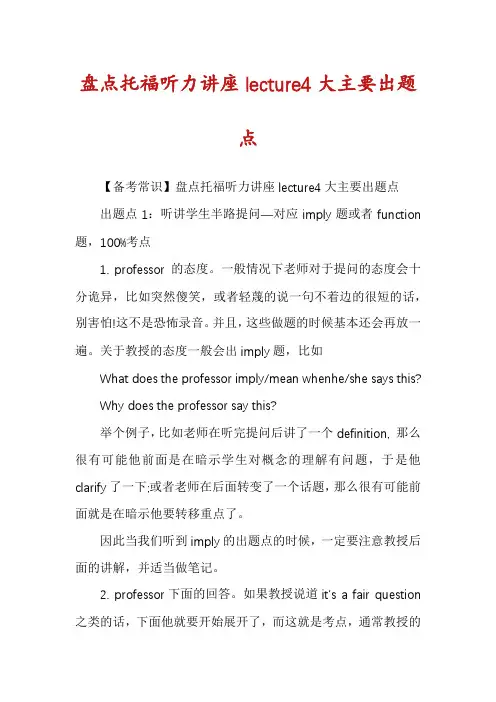
盘点托福听力讲座lecture4大主要出题点【备考常识】盘点托福听力讲座lecture4大主要出题点出题点1:听讲学生半路提问—对应imply题或者function 题,100%考点1. professor的态度。
一般情况下老师对于提问的态度会十分诡异,比如突然傻笑,或者轻蔑的说一句不着边的很短的话,别害怕!这不是恐怖录音。
并且,这些做题的时候基本还会再放一遍。
关于教授的态度一般会出imply题,比如What does the professor imply/mean whenhe/she says this?Why does the professor say this?举个例子,比如老师在听完提问后讲了一个definition, 那么很有可能他前面是在暗示学生对概念的理解有问题,于是他clarify了一下;或者老师在后面转变了一个话题,那么很有可能前面就是在暗示他要转移重点了。
因此当我们听到imply的出题点的时候,一定要注意教授后面的讲解,并适当做笔记。
2. professor下面的回答。
如果教授说道it’s a fair question 之类的话,下面他就要开始展开了,而这就是考点,通常教授的回答会是例子+观点/观点+例子。
这里可能会出功能题,就是问professor举这个例子有什么用。
出题点2:professor举的例子—对应功能题Professor举例子的时候一定要把例子记下来,并且要知道他在例子之前说了什么,因为例子论证的一般都是前面的观点。
举例子的关键词有for example, for instance等,基本就是摆好架子要开说了,听到这些短语就抄起笔/竖起耳朵赶紧听吧。
还有在example中也有一些重点词语要注意,比如then, so, in this way, ok, the next stage, well等等,包括一些逻辑词,都是关键点。
这个考点出题的时候一般会问:Why does the professor use the example of。
lecture

1990
Quantum confined Stark effect in quantum wells
5. Quantum optoelectronic devices
6. Quantum transport devices
1956 J. Bardeen, W. Brittain, W. Schockley: For inventing the transistors
1900 Planck’s Quantum Theory
d 2k 2k dk 2 2 ( 4 ) 2 (4 ) 2 m 2 dE
2dk 2 2 1 2m dE E
Density of States2-D 3-DFra bibliotek1-D
0
E
0
E
0
E
1 D1D
2m E
D2 D
m 2
D3 D
m 2mE 2 3
Density of States of Various Quantum Structures
Conduction band
k
Heavy hole band
2k 2 E E0 2m
Effective mass is related to the curvature of the energy band
Light hole band
2 m 2 d E dk 2
Electron’s velocity is also related to the band structure
大学英语3第三课PPT课件
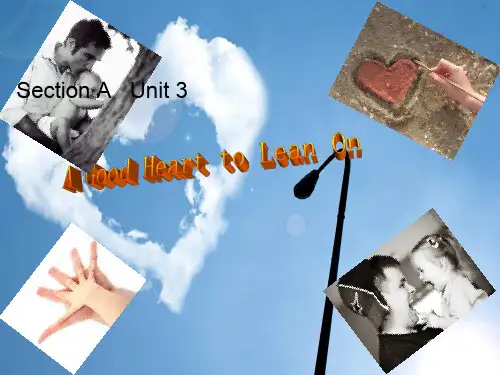
I play online games on occasions.
我偶尔玩玩网络游戏。
On the occasion of the Spring Festival, may you enjoy health, happiness and every success!
值此春节之际,谨祝你健康、幸福、万事如 意!
tell sb. sth., esp. sth. that has been kept secret
She never let on she was married. 她从不透露她已经结婚。
He knew where his brother was going, but he didn't let on. 他知道他哥哥去哪里了,但是他不露声色。
II. Lead-in Activities 1. How many kinds of love should we keep in mind?
Romantic love
Love between friends
Care for people around
II. Lead-in Activities 1. How many kinds of love should we keep in mind?
倚,靠
大多数大学生依靠父母的经济援助。
他们有困难时总寻求我们的支持en they are in trouble.
2. adjust
change so that it fits or works better
v.调整
You can adjust the color on the TV by turning this knob.
大学毕业后他从商了。
lecture36
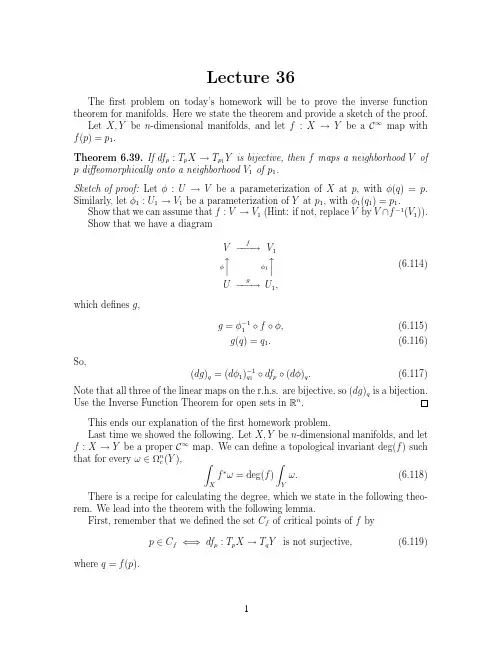
(6.127) (6.128)
Let f0 , f1 : X → Y be proper C ∞ maps. Suppose there exists a proper C ∞ map F : X × [0, 1] → Y such that F (x, 0) = f0 (x) and F (x, 1) = f1 (x). Then deg(f0 ) = deg(f1 ). (6.129)
i
(6.123)
(6.124)
(6.125) (6.126)
φ(gi (Cgi )).
Sard’s Theorem tells us that gi (Cgi ) is a set of measure zero in U , so
U − gi (Cgi ) is nonempty, so W − f (Cf ) is also nonempty. In fact, this set is not only nonempty, but is a very, very “full” set.
1
Lemma 6.40. Suppose that q ∈ Y − f (Cf ). Then f −1 (q ) is a finite set. Proof. Take p ∈ f −1 (q ). Since p ∈ / Cf , the map dfp is bijective. The Inverse Function Theorem tells us that f maps a neighborhood Up of p diffeomorphically onto an open neighborhood of q . So, Up ∩ f −1 (q ) = p. Next, note that {Up : p ∈ f −1 (q )} is an open covering of f −1 (q ). Since f is proper, f −1 (q ) is compact, so there exists a finite subcover Up1 , . . . , UpN . Therefore, f −1 (q ) = {p1 , . . . , pN }. The following theorem gives a recipe for computing the degree. Theorem 6.41. deg(f ) = where � +1 if dfpi : Tpi X → Tq Y is orientation preserving, σpi = −1 if dfpi : Tpi X → Tq Y is orientation reversing, Proof. The proof is basically the same as the proof in Euclidean space. We say that q ∈ Y is a regular value of f if q ∈ / f (Cf ). Do regular values exist? We showed that in the Euclidean case, the set of nonregular values is of measure zero (Sard’s Theorem). The following theorem is the analogous theorem for manifolds. Theorem 6.42. If q0 ∈ Y and W is a neighborhood of q0 in Y , then W − f (Cf ) is nonempty. That is, every neighborhood of q0 contains a regular value (this is known as the Volume Theorem). Proof. We reduce to Sard’s Theorem. The set f −1 (q0 ) is a compact set, so we can cover f −1 (q0 ) by open sets Vi ⊂ X, i = 1, . . . , N , such that each Vi is diffeomorphic to an open set in Rn . Let W be a neighborhood of q0 in Y . We can assume the following: 1. W is diffeomorphic to an open set in Rn ,
托福听力tpo55 lecture1、2、3 原文+题目+答案+译文
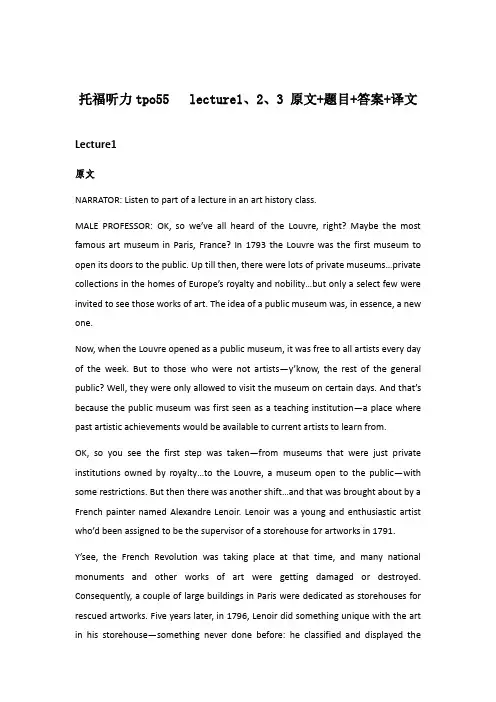
托福听力tpo55 lecture1、2、3 原文+题目+答案+译文Lecture1原文NARRATOR: Listen to part of a lecture in an art history class.MALE PROFESSOR: OK, so we’ve all heard of the Louvre, right? Maybe the most famous art museum in Paris, France? In 1793 the Louvre was the first museum to open its doors to the public. Up till then, there were lots of private museums…private collections in the homes of Europe’s royalty and nobility…but only a select few were invited to see those works of art. The idea of a public museum was, in essence, a new one.Now, when the Louvre opened as a public museum, it was free to all artists every day of the week. But to those who were not artists—y’know, the rest of the general public? Well, they were only allowed to visit the museum on certain days. And that’s because the public museum was first seen as a teaching institution—a place where past artistic achievements would be available to current artists to learn from.OK, so you see the first step was taken—from museums that were just private institutions owned by royalty…to the Louvre, a museum open to the public—with some restrictions. But then there was another shift…and that was brought about by a French painter named Alexandre Lenoir. Lenoir was a young and enthusiastic artist who’d been assigned to be the supervisor of a storehouse for artworks in 1791.Y’see, the French Revolution was taking place at that time, and many national monuments and other works of art were getting damaged or destroyed. Consequently, a couple of large buildings in Paris were dedicated as storehouses for rescued artworks. Five years later, in 1796, Lenoir did something unique with the art in his storehouse—something never done before: he classified and displayed thepaintings and statues by period and style.So people began to notice—and admire—what Lenoir was doing. And soon, he transformed his storehouse into what would become the National Museum of French Monuments, which would later become a branch of the very Louvre that started this whole discussion. And, uh, what’s even more notable is that, Lenoir’s system of classification and display—it became a model for other public art museums…with each room in the museum representing a different century or period of art. Lenoir’s belief that a museum should be concerned with public instruction and offer education according to historical periods—this concept seems obvious now, but it was groundbreaking back then.Interestingly, though, not everyone was, uhh…impressed with Lenoir…or with museums in general, for that matter. There were people—including some artists and historians—who were as much against museums as Lenoir was for them. In fact, some argued that museums would pretty much bring an end to art. They contended that works of art removed from their original context were…incomplete—that artworks ought to remain in the places…the mountains, towns, uhh…in the locations where they were originally created and viewed.Take a painting created in an Italian seaside village, for example. Could that painting maintain its same identity once it was moved to a museum in France? Nowadays, most of us know and appreciate the fact that we can go to a museum and see many works of art from different time periods, artists, and countries. The fact that anyone can go into one place and see works of distant cultures, enjoy their beauty, and even find inspiration in them benefits us all. The Louvre clearly embraces this concept. But there are still some skeptics, people today who are just as skeptical of art museums as the critics were back in Lenoir’s day…and for all the same reasons.题目1.What is the lecture mainly about?A. The influence of private art galleries on public museumsB. The role of art museums as teaching institutions for artistsC. The debate about the Louvre’s opening to the publicD. The early history of the public art museum2.Why does the professor mention that artists were allowed to visit the Louvre every day?[Click on 2 answers.]A. To point out that the public museum was conceived as a place for studyingB. To indicate that all citizens were able to visit the museum whenever they wantedC. To question why certain artists did not spend time at the LouvreD. To contrast the accessibility of art in the Louvre with that of art in private museums3.Why does the professor mention the French Revolution?A. To name an event depicted in Alexandre Lenoir’s artworkB. To identify the theme of an exhibit room in the LouvreC. To explain why art storehouses were createdD. To help explain some people’s attitude toward public museums4.According to the professor, what major contribution did Alexandre Lenoir make to the art community?A. He donated many original paintings to public museums.B. He developed a systematic way of exhibiting art in museums.C. He invented a unique way to restore damaged artwork.D. He designed a national monument in post-Revolution France.5.The professor gives an example of a painting made in an Italian seaside village. According to the professor, what would some skeptics say about that painting?A. It should not be exhibited unless it appeals to people from a variety of cultures.B. It should not be moved out of the geographic area in which it was created.C. It should be exhibited in the Louvre before traveling to any other museum.D. It should always be grouped with similar paintings in a museum.6.What opinion about public art museums does the professor express?A. They focus too much on entertainment and not enough on education.B. They are more important to artists than to the general public.C. Their way of exhibiting artwork needs to be modernized.D. They succeed in allowing varied works of art to be appreciated in a centralized location.答案B ADC B B D译文旁白:听艺术史课上的一篇讲座。
高级英语 上海复旦大学 Lesson Three
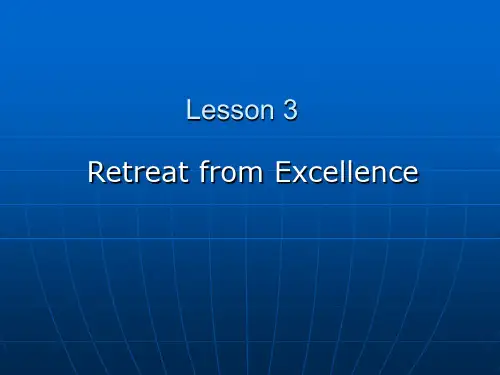
Thrive on public ignorance It can be argued that . . .
differences among people. After all, one citizen is as good as another. Know one’s business Come under the tender care of
Take what you can get. Take issue with . . . Encourage a cult of mediocrity Very little mention has been made of . . . Have far-reaching consequences Adjust the curriculum to the abilities of the
Par 7. The general mood of the general public is complacence and people have neglected the role of the potential leaders.
Par 8. the lack of competition and incentive among the workers
Phillips Academy, better known as Andover, in the United states , is a coeducational independent boarding high school of 1,087 students, known for its extensive and rigorous academic program. A diverse community of teachers and students, the academy was founded in 1778.
必修三M3课时讲义
必修三M3课时讲义课堂导入教材复现在空白处填入适当的内容(1个单词)或括号内单词的正确形式。
1.They can destroy houses, but leave the furniture inside exactly ________ it was.答案:where2.________ average, there are 800 tornadoes in the US each year, causing about 80 ________ (death) and 1,500 ________ (injury).答案:On; deaths; injuries3.By the time it ended, more than 700 people had been killed and 2,700 had ________ (injure).答案:been injured4.The worst hurricane disaster of all time ________ (occur) the 8th September 1900 in Galveston, Texas.答案:occurred on5.The cemetery where Coghlan was buried was ________ (destroy) by the hurricane and Coghlan's coffin ended up ________ the sea.答案:destroyed; in6.China is situated in one of the most active earthquake regions in the world and there ________ (be) many terrible earthquakes.答案:have been7.________ all, 830,000 people lost their lives.答案:In8.The California Earthquake of the 18th of April 1906 is the worst earthquake ________ has ever happened.答案:that9.Fires ________ (cause) by the California Earthquake did the most damage.答案:caused10.The fires burned for three days, ________ (destroy) a total ________ 25,000 buildings.答案:destroying; of~~~~~~~~~~~~~~~~~~~~~~~~~~~~~~~~~~~~~~~~~~~~~~~~~~~~~~~ ~1experience vt.经历;体验n.[C]经历;[U]经验Do you know anyone who has experienced one of the events?(P21) 你认识曾经经历过其中一种事件的人吗?(1)experience⎩⎪⎨⎪⎧[U] 经验[C] 经历have much experience in/at sth. 在……方面有经验lack of experience 缺乏经验an unforgettable experience 一次难忘的经历(2)experience sth. 体验/经历/感受某事(3)experienced adj. 有经验的be experienced in/at 在……方面有经验知识讲解①[2013·四川高考]Home is where we can remember pain, love, and some other experiences:_we parted here; my parents met here; I won three championships here.家是我们能记得痛苦,爱和一些其他经历的地方:我们在这里分开;我的父母在这里见面;在这里我赢得三个冠军。
视野视听说第二版第三册听力文本和答案(重点词句标注)
视野视听说第二版第三册听力文本和答案(重点词句标注)Unit 1 Enjoy the colorful campus life!P3 II. Basic Listening Practice1.ScriptW: Have you chosen your electives for next semester yet? Are you taking French writing again?M: Yes I am, but it’s compulsory for us next semester. So I think I’m gong to do mar keting as an elective instead.Q: Which class will the man choose as his elective?2.ScriptM: Did you go to that business strategy lecture on Friday? I missed it and need to copy your notes.W:I’d say you could borrow my notes, but Sarah’s got them. Be careful not to miss Professor Brown’s seminar; he takes attendance in that.Q: What is the woman telling the man?3. ScriptW: Wow, Steven! In the library! What brings you here?M: I’m enjoying the view. All the girls in fashion design are here preparing for an exam on Monday.Q: Why is the man in the library?4. ScriptW:How’s your group doing with this statistics presentation? Mine’s terrible.M: Yeah, mine too. David and Mike are OK, but Steven doesn’t pull his weight and Suzie’s never around. I don’t see how we can pass unless Steven and Suzie realize that this is their last chance.Q: What is the true of Steven and Suzie?5. ScriptW: You took an MBA at Harvard Business School, didn’t you? What’s it like?M: It’s expensive, about U.S. $ 40,000 a year, p lus the costs of food and housing. But the teaching is first class. The professors have a lot of practical experience. They use the case system of teaching; that is, you study how actual businesses grew or failed.Q: Why is he MBA teaching in Harvard Business School first class, according to the conversation?Keys: 1.C 2.D 3.B 4.D 5.AIII. Listening InP4 Task1: On the First DayScriptHarrison: I’m Harrison. Good to meet you. So you’ve bought the books for this biology class.Jenny: Sure, I think everyone had to before class started.Harrison: No. Usually no one does much on the first day because it’s still add-drop. 选科Jenny: What’s that?Harrison: Changing from class to class to find out which one is best. Hey, where are you from?Jenny: Poland. Have you had this teacher before? I’ve heard he is really good.Harrison: He’s good if you’re a hard-worker. He expects a lot.Jenny: Oh, I guess that’s good. I ho pe I can keep up with everyone else in the class. Maybe I need your help after class.Harrison:You’re welcome.…Professor: All right. See you guys next week.Student: See you.Jenny: Harrison, wait up!Harrison: So what do you think about the professor’s lecture?Jenny: I think half of what he said went over my head.Harrison: That’s all right. A lot of what he said is explained in the reading.Jenny: Hey, would you mind if I borrowed your notes tonight to look them over?Harrison: No problem. We don’t hav e class until Wednesday. Here you go.Jenny: Thanks. I just want to make sure I’m prepared for the seminar.Harrison: Yeah, participation in the discussion is an important part of the education here.Seeing that Jenny has bought the books for the biology class, Harrison says nobody does much on the first day because it’s still add-drop, which means students are changing from class to class. Jenny knows the professor is really good. But Harrison warns her that the professor is good, only if students are hard-workers, for he expects a lot.After class, Jenny admits that half of what the professor said went over her head, and Harrison assures her that a lot of what the professor said is explained in the reading.When Jenny asks to borrow Harris on notes, he says “on problem”, for they don’t have class until Wednesday. Finally, Harrison says participation in the discussion at the seminar is an important part of the education there.P5 Task 2How to select elective courses?To begin with, you should select the courses that fit your profession. It is a good idea to choose elective courses closely related to your chosen profession. Potential employers未来的老板will appreciate every bit of extra training and knowledge that they don't have to give you. For example, you may select elective courses in chemistry, biology or even physics if you are doing a science major. For business majors, select electives in accounting, business administration, and even computing, as you'll never know when these will come in handy使用 in the corporate world 商业世界.Moreover, you can choose an education that includes many fields of study. If you are taking a heavy load of许多career-related courses, you may prefer electives that are not directly related to不直接your major. If you receive a well-rounded education接受全面的发展教育, some employers believe that you have better potential. For example, if you have courses in science along with your business degree, you could possibly win a job over someone who majored purely in business with no outside electives. Finally, you can also select a challenging elective course. Part of getting an education is learning how to learn, and elective courses should help you achieve this goal. You need not to memorize all the information from each class, but you should get a better understanding of the world. So, pick elective courses that challenge your belief system and make you look at the world in a different way. For instance, you can consider a philosophy elective if you have been told that you are a little narrow-minded.P6 Task3: How to Get Straight A’sScriptIt is interesting to note how straight A students achieve academic excellence. Here, according to education experts andstudents themselves, are the secrets of super-achievers.设置优先事项;抓住重点Top students allow no intrusions on study time. Once the books are open or the computer is turned on, phone calls go unanswered, TV shows unwatched, snacks ignored. Study is business, and business comes before在先recreation娱乐 .事业在娱乐的前面Also, good students can study anywhere and everywhere. Claudia Hill, an Arizona State University business professor recalls a cross-country runner who worked out every day. Hill persuaded him to use his spare time to memorize biology term. Then he posted a list of biology terms on the mirror in the bathroom. He learned a few terms every day while brushing his teeth. Eventually, he scored high on the final examination.Moreover, top students schedule their time well. Study times are strictly严格的,完全的 a matter of事关personal preference个人喜好,偏好. Some work late at night when the house is quiet. Others awake early. Still others study as soon as they come home from school when the work is fresh in their minds. All agreed, however, on the need for consi stency. A student says, “Whatever I was doing, I main taineda certain period of time every day for studying.”Another important characteristic of super-achievers is that they know how to read, According to a book entitled Getting Straight A’s, the secret of good reading is to be “an active reader---one who continually asks questions that lead to a full understanding of the author’s message”.1.Which of the following is NOT mentioned about super—achievers starting to study?2.What did the cross-country runner do to score high on theexam?3.What is the good thing all top students agree on?4.What does the speaker mean by “an active reader”?5.What is the main idea of the passage?Keys: 1B 2.C 3. D 4.A 5.DIV. Speaking OutMODEL 1 You’re just going to have study h ardNora:Only our first day back at school, and already I feel like I’ve learned a lot.Chris:Only our first day back at school, and I already feel like I’m up to my ears in homework.Nora: You’re going to have to hit the books if you want to keep your grades up.Chris:Tell me about it! I already have two reports, two books reports, a composition, an oral report, and a research project—all due 全部到期 before midterms.Nora: We could work together. Maybe some of my organized study habit有组织的学习习惯would rub off on有帮助 you.Chris: Better yet, maybe you could do my homework for me.Nora: Forget it! That would be cheating.Chris: All right, all right. I have yet to write a term paper. Can you recommend any articles and books? You’d better find me the exact pages wher e I can find what I want.Nora: You could borrow ideas from references, but if you quote引述,引用without giving the sources, you’re plagiarizing. 剽窃,抄袭Chris: The quiz next week will be a headache. If you don’t help me, I’ll have to prepare some study sheets 小抄and hide them in my hand when I take the test.No ra: Oh, no! If you’re caught, the professor will definitelygive you an F. Probably, you will have to repeat the year.Chris: All right, I’ll take your advice. The library is going to be my new home, and in the dorm 宿舍I’ll be burning the midnight oil.MODEL2 Which class do you prefer?ScriptChris:First period is math with Mr. Woods. I don’t know how am I going to stay awake?Nora: I like Mr. Wood. He’s interesting.Chris: He’s boring! He could put the en tire basketball team to sleep—during the championship game! Who do you have for economics?Nora:Mrs. Jenkins. She’s smart. Students really learn a lot from her.Chris: She’s tough! You have to work hard in her class, or you’ll probably fail.Nora: No pain, no gain.Chris: Nonsense, You could have learned even more with Mr. Sharp. But not many students opt for his class.Nora:What’s wrong with him?Chris: Often, the highest grade he gives on a term paper is C+, and he usually fails half of the students.Nora:No wonder he’s got the nickname Mr. Shark. Well, how about PE? What are you doing this semester?Chris:That’s the worst part. In PE, we’re learning t’ai chi. I’m bored to death.Nora: Ha-ha! Not to rub salt into the wound, but our class is playing your favorite sport: basketball.Chris: Oh…that figures! This is going to be a terrible semester.Nora: This is going to be a great semester!MODEL3 Publish or perishScriptChris: Tell us, Professor Grant, What are your primary duties as a professor?Professor Grant: Well, I do a lot of research and writing. It’s rough being an associate professor.It’s publish or perish.vi.死亡,丧生Chris: So you spent a lot of time in your office?Professor Grant: Yes, but I also have to prepare class notes, give lectures, hold office hours.Teaching is an important part of being a professor.Chris: With all those responsibilities, you must make a lot of money.Professor Grant: I wish. Actually, I spend a lot of time applying for grants基金( grant的名词复数 );补助金;授给物(如财产、授地、专有权、补助、拨款等)to fund my research. Then I can offer assistantships助教费and scholarships to the worthy graduate students who can help me with my research project.Chris: I see why they call you “the boss”. But being a professor s ounds pretty competitive.Professor Grant:Actually, I think you were in one of my classes…Chris: Um….I think you’re mistaken, Professor Grant!Professor Grant: No, I remember very clearly now! You owe me an essay!Chris: Sorry, I have too much work to do for the Student Union Newsletter, and I have to work two jobs to pay for school.Professor Grant: So you get an F in this course.P14V. Let’s Talk Maintaining the quality or increasing the intake?Interviewee: It's a really difficult balance to strike, actually maintaining the quality but making sure as many young people as possible and older people as well—there's been a surge极速增加in the number of over 25s applying, and we take many people who are over 25. But we've got to get that balance right.It's going to be terribly difficult for us next year.Hostess: Given the cuts that the government announced a couple of weeks ago, and the numbers that we know in terms of applications, where are you going to draw that line? Are you going to have to look at cutting intake in order to maintain the quality of the courses?Interviewee: We're trying not to cut intake at the moment. But what it means is we're going to have to be extra-cautious in the number of offers we make, because we simply cannot afford to go over our quota of the number of places that we can offer. Because if we do, it means that we could be fined, or we just simply haven't got enough money to make sure the students' experience is right. So it means that maybe last year we would allow a few more people to have an offer. This year is going to be tougher.Hostess: Do you lay some of the blame for the situation at the door of the government?Interviewee: If you look to France, Sarkozy is actually increasing the budget for higher education.Obama in the U.S. has done the same thing. So we're just slightly puzzled as to why the government seems to be cutting back on higher education rather than pumping more money into what we think is a service that is absolutely vital for the economy.VI. Further Listening and SpeakingP.16 Task 1 Problems with our educational systemHi, everybody. My topic today is “Problems with Our Educational System”.There are a lot of things in our educational system that I don’t agree with. It seems t hat educators just want to give standardized tests, which focus only on academic performance but neglect忽略students’abilities an d interests in other areas. I think there’re a lot of people who are very intelligent, but haven’t had the opportunities they could’ve had, had they been educated in a broader-minded胸襟开阔的educational system. I feel that a lot of courses that students are forced to take in high school are too academic, and, as a result, many kids lost their interest in learning.Educators have failed to recognize various kinds of intelligence. They often exert a lot of pressure on students to be as well-rounded面面俱到的as possible. I think being well-rounded isn’t really possible. And as a consequence, some students who are believed to be intelligent can’t get into good colleges if they, for example, haven’t scored well on the math section, even if they ate brilliant writers.Another thing that disturbs me is that the so-called “weak students” are separated from the rest of the school. Some kids are kept in a separate class if their grades are lower then others. And they’ve very aware of their social position, you know. I think it causes them to act in a way that is not really positive. They’re just acting in a way that they are expected to act. Often thei r grades go from bad to worse. And that’s pretty sad to me. I think that many of the kids in those classes are intelligent, but never actually realize their potential because of the way they are treated very early on in theirP16 Task 2: The Final ExamScriptAt a university, there were four sophomores二年级的学生taking a chemistry course. They were doing so well on all the quizzes, mi dterms, labs, that each had “A” so far for the semester.These four friends were so confident that on the weekend before finals, they decided to go up to the University of Virginia and party with some friends there. They had a great time, and didn’t make i t back to school until early Monday morning.Rather than taking the final then, they decided to find their professor after the final exam and explain to him why they missed it. They explained that they had planned to come back in time for the final exam, but, unfortunately, they had a flat tire气不足on the way back and didn’t have a spare. As a result, they missed the final.The professor thought it over and then agreed they could make up the final the following day. The guys were relieved and elated兴高采烈的. The next day, the professor placed them in separate rooms, handed each of them a test booklet, and told them to begin.They took at the first problem, worth five points. It was a simple question on a chemical reaction. “Cool,” they thought at the same time, e ach one in his separate room, “This is going to be easy.” Each finished the problem and then turned the page.On the second page was a question worth 95 points: “Which of the tires was flat?”P17Task3: Harvard UniversityScriptHarvard University is the oldest institute of highest learning最古老的高等学府 in the United States.Founded 16 years after the arrival of the Pilgrims at Plymouth, the university has grown from 9 students with a single master to the present enrollment登记of more than 18,000 students, including undergraduates and students in 10 graduate and professional schools. Over 14, 000 people work at Harvard, including more than 2,000 faculties. Harvard has produced six presidents of the United States and 34 Nobel Prize winners.During its early years, Harvard offered a classic academic course based on the model of English universities, but consistent with the prevailing Puritan philosophy. Although many of its early graduates became ministers in Puritan churches throughout New England, the university never formally affiliated 附属的with a specific religious group.Under President Pusey (1953-1971), Harvard started what was then the largest fund-raising campaign 筹款活动in the history of American higher education. It was an 82.5 million dollar program for the university. The program increased faculty salaries, broadened student aid, created new professorships 教授职位, and expanded Harvard’s physical facilities.Neil L. Rudenstine took office as上任Harvard’s 26th president in 1991. As part of an overall effort to achieve greater coordination协调among the university’s schools and faculties, Rudenstine encouraged academic planning and identified some of Harvard’s main intellectual priorities. He also stressed the importance of the university’s excellence in undergraduate education大学本科教育, the significance of keeping Harvard’s doors open to students from families of different economic backgrounds, the task of adapting the research university to an era时代of both rapid information growth and serious fundshortage. 作为整体的一部分,努力实现更大的协调在大学的学校和教师,陆登庭鼓励学术计划和确定哈佛的一些主要的知识重点。
Unit 3-Lecture3-课件
Unit3 Going abroad Lecture3 How to design an academic calendarLearning objectives: (学习目标)01 The semester and vacations of western college.02 Practical writing : learn to design an academic calendar of a summer program.Get some knowledge about summer program and academic calender.What the summer program and academic calendar means?暑期项目和校历是什么意思?Summer program offers adults of all ages and backgrounds anintensive learning experience with the opportunity to live insome university.暑期项目为所有年龄和背景的成年人提供了一个深入学习的机会,住在一些大学。
Read the following academic calendar of a summer programme.During this two-week summer programme, students from Weihai Vocational College will attend language classes, take part in cultural projects and off-campus excursions in South Carolina College in the US.在这个为期两周的暑期项目中,威海职业学院的学生将在美国南卡罗来纳学院参加语言课程、参加文化项目和校外游览。
学术英语unit 3译文
第三单元Passage A[参考译文]教育之道:东方和西方1.一位来自加拿大的老师最近参观了一所日本的小学。
在一堂课上,她观看了60个小孩子在学习画猫。
任课老师在黑板上画了一个大圆圈,60个孩子就模仿着画在纸上。
老师在第一个圆圈上面画了一个小些的圆圈,然后又在小圆圈上面画了两个三角形;孩子们也以完全相同的方式继续画着他们的猫。
这堂课就这么继续着,直到教室里有了61只一模一样的猫。
2. 这节课让那位加拿大老师大为吃惊。
这类教学方法--以及它们的效果--同她自己国家的迥然不同。
加拿大学校里的一节美术课会产生满满一屋子独一无二的图画,而不是一张又一张完全相同的猫。
为什么呢? 是什么造成了这种教学方法上的不同呢?3.在任何国家的任何一个教室里,老师教的都不仅仅是艺术、历史或语言。
课堂活动的一部分--有意识或无意识地--是在传授文化:社会的观念、价值观和信仰。
每一种教育制度都不可避免地是一面反映其所在社会的文化的镜子。
4. 在像美国或加拿大这样由许多不同的民族、宗教团体和文化取向构成的西方社会中,个性和独立思考受到高度重视。
这些价值观通过这些国家的教育制度反映出来。
老师们强调那些使每个学生都与众不同的品质。
他们很少要求学生熟记信息;却鼓励他们独立思考,独自寻找答案,并提出各自的解决方法。
学生们从小就学着形成自己的意见和看法,并在课堂讨论中各抒己见。
5. 在日本则截然不同,绝大多数人有着同样的语言、历史和文化。
也许是由于这个缘故,那儿的教育制度反映了一种对集体目标和传统而不是对个性的信念。
日本的学童经常在一起学习,做作业时相互帮助。
在教室里,教师是主要的知识来源:教师讲,学生听。
没有很多的讨论;学生们却要背诵他们已经记住的规则或信息。
6. 日本教育制度的优点是那儿的学生能学到合作的社交技能。
另一个优点是他们学的数学和自然科学比大多数美国学生多得多。
他们每天学习的时数和每年学习的天数也比北美的学生多。
这种制度要求高,但它却使孩子们能为进入一个重视纪律和自制的社会作好准备。
- 1、下载文档前请自行甄别文档内容的完整性,平台不提供额外的编辑、内容补充、找答案等附加服务。
- 2、"仅部分预览"的文档,不可在线预览部分如存在完整性等问题,可反馈申请退款(可完整预览的文档不适用该条件!)。
- 3、如文档侵犯您的权益,请联系客服反馈,我们会尽快为您处理(人工客服工作时间:9:00-18:30)。
Resource-based View of the Firm
• Focus on the internal resources • Strengths – human and non-human • Rarity, un-inimitable and non-substitutable • Added value • Human process advantage • VRIO
Organisational Strategy: Approaches
Rationality Evolution Process Systems
Managing People
• A history of people management • Early history of people management
performance? • Many organisations do not adopt this approach, but remain competitive – WHY? • If firms can relocate to countries where low-pay, sweatshop conditions and insecurity prevail – WHY NOT?
HRM Best Practices
• HR considerations are part of all strategic level
deliberations • High employee commitment and continuous improvement encouraged by strong culture, high levels of worker involvement and consultation • High trust relationships and teamworking • Employees undertake continuous skill development for personal growth and task flexisms of Best Fit
• Contingent factors are important, but do not
necessarily shape organisational forms and practices • Importance of choice and mediation • Importance of political factors, human values etc.
2005)
• HR issues are the concern of ALL managers
Criticisms of Best Practice
• Logical – what IS best practice? • How does best practice link to organisational
Local/national/global political, economic and cultural patterns
Strategy makers values and personal/group interests
Managerial debate, negotiation and choice
ORGANISATIONAL STRUCTURE
JOB DESIGN
PERFORMANCE EXPECATIONS
•objectives to minimum levels •external control and inspection •quality = acceptable
•objectives designed to ‘stretch’ and ‘develop’ •self-control •self/peer inspection •continuous improvement in quality •variation related to group performance •pay linked to skill
built into employment • Long-term employment • Task variability
High and Low Commitment Strategies: Low
• Hire and fire principles • Task simplification • Little or no training • ‘Arms length’ relationship • Instrumentality and calculation
REWARDS
•variation related to individual incentives •individual pay linked to job evaluation
COMMUNICATION
•managers seek and give information •information used for sectional advantage •information on a need to know basis
Criticisms of RBV
• Importance of external environment • Organisations are not ‘free standing’ • Global competition • Importance of sectoral similarities • Plurality of organisations/labour markets • Inward looking
The degree of uncertainty employee constituencies are seen as creating for the organisation’s long-term future
Low commitment HR strategies
Watson, T. (2005)
•two-way communication •information shared for general advantage •business information is shared
EMPLOYMENT RELATIONS
•adversarial, collective, win/lose •trade-unions as inconvenient constraints OR as convenient intermediaries •training for specific tasks •emphasis on courses •appraisals: Management setting and monitoring of objectives •focus on the job •marginal and restricted to welfare and administration •reactive and ad-hoc •staffed by personnel specialists
Components of high commitment strategy (HR creates high levels of uncertainty for managers •shared values •emphasis on problemsolving •customer focus •learning from mistakes •flat •mutual influence •decentralisation •organic/flexible •job enrichment •conception-execution combined •multi-skilled individuals •indirect control/autonomy
• HRM in modern industrial
capitalism
• The rise of strategic HRM
• Work, people and HRM
Managing HRM Strategically
• The nature of HRM strategies • HRM as strategy • HR strategy and corporate strategy • What comes first, ‘chicken or egg’ • Models • Best fit • Best practice • Resource-based view of the firm
Best Practice
• One ‘best’ way • ‘Adoption of
‘enlightened’, ‘progressive’, ‘people first’, ‘high performance’ or ‘high commitment’ employment practices, regardless of the organisations circumstances
High commitment HR strategies
Components of low commitment strategy (HR creates low levels of uncertainty for managers) ORGANISATIONAL CULTURE • rule-based • emphasis on authority •task-focus •mistakes punished •hierarchical •top-down •centralisation •mechanical bureaucracy •deskilled/fragmentatio n •conception-execution split •single skill •direct control
